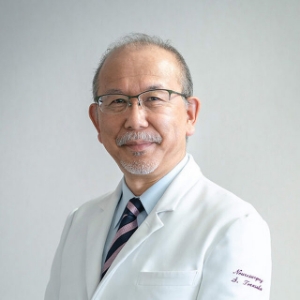理事長ブログ
「私のメンター 福島孝徳先生を偲んで」

福島孝徳先生が亡くなることなど夢にも思っていませんでした。いつまでも元気で私達を叱咤、激励してくれるものだと勝手に思い込んでいました。自称、福島先生の弟子たちのもとに訃報が届いたのは2024年3月21日で、Duke大学のホームページで3月19日に先生が逝去されたことを初めて知りました。経験したことのないような寂しさを感じ、恩返しのできていない自分の不甲斐なさに失望する毎日です。
私が初めて福島先生にあったのは1996年3月に米国コロラドのAspen Snowmassで福島先生が主催されたWinter meetingに参加した時だったと思います。当時私は北海道大学脳神経外科教室の一員でアーカンソー州のUniversity of Arkansas for Medical Scienceという施設に留学していました。当時注目されていた脳神経外科医Al-Mefty先生のもとでその後私のライフワークになる頭蓋底手術の勉強をしていました。手術のための外科解剖を勉強していたのですが、世界中から沢山のフェロー達が集まっていたためになかなか自分にはチャンスが回ってきませんでした。そんな時に当時の北海道大学脳神経外科教授の阿部弘先生がこのWinter meetingに参加されるという情報をキャッチして、私もアーカンソーからコロラドへ向かいました。そこで教授にアーカンソーでの窮状を訴えたところ福島先生を紹介され、なんとスキー場で私の移籍がトントン拍子で決まってしまいました。私は嬉しかったのですが、実はフェローが移籍をするというのはなかなかハードルが高いことが後から判明します。1996年7月にU-Haulというone-wayレンタルトラックを借りて南部のアーカンソーから北部のピッツバーグまで家族と3泊4日の大移動を行いました。私は福島先生のフェローとなりAllegheny Neuroscience Instituteというラボの一員となりました。
ANIといわれるラボには十分な研究環境があり中国系のShir先生がLab.のお世話をしてくれることになり私のピッツバーグ生活がスタートしました。福島先生は外来、手術、学会、研修医の教育、我々フェローの指導等大変忙しくされていました。今思うときっといろいろな事情があったことと思いますが、時には夕方から大手術が始まったことに驚きましたが、研修医たちが“Bye Taka!”と言って夕方には手術から降りて帰っていくのを見たときにはもっと驚きました。今でいう働き方改革で、当時の米国では研修医の1週間の勤務時間が厳密に管理、制限されていました。福島先生は当時頭蓋底手術の教科書の執筆に取りかかっており、その一端を担わせていただくのが私の仕事となりました。Lab.で福島先生の手術を再現してその詳細な外科解剖を多くのフェローたちと一緒に論文にしていきました。多くの時間を注ぎ込んだManual of Skull Base Dissectionという成書が完成した時にはフェローみんなで喜んだものです。フェローたちは福島先生から勇気の出る言葉をいただきながら仕事をしていました。Second editionとthird editionに書いていただいた先生の言葉です。(Figure 1 & 2)
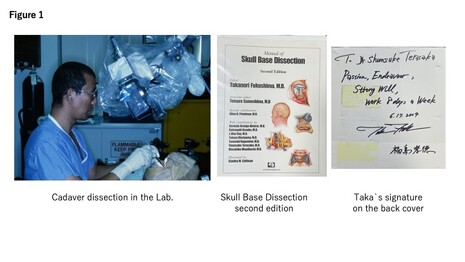
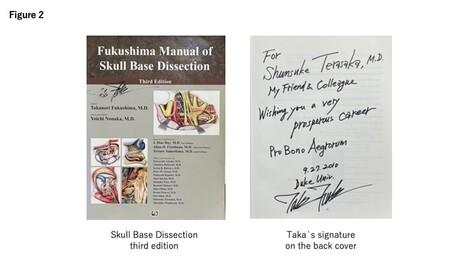
私は当時beeper(ポケベルです)を持たされており、時々手術室に呼ばれてもいました。福島先生の顕微鏡は金色に塗られてdinosaurと呼ばれていました。私は勉強のために当時の福島先生の手術ビデオを見返すことがありますが、25年経った今見ても非常に見事な手術をされていたと思います。私は福島先生のもとで勉強するまでは聴神経腫瘍の手術できれいに顔面神経が温存された例をあまり経験していませんでした。これは北海道大学の手術のレベルが低かったというのではなく日本ではどこでもそうだったと思います。福島先生の顔面神経が綺麗に温存される聴神経腫瘍の手術をみて私もこのような手術をしたいと心から思ったことをよく覚えています。日本に帰国してしばらくしたのちに手術の勉強のために当時福島先生が在籍していたDuke大学を再び訪ねたことがありました。ライブで手術を見学し、ライブラリで福島先生の手術を勉強し、自分の手術ビデオも恥ずかしながら見ていただき、怒られたのも良い思い出です。私は1997年の3月にvisaの関係で帰国を余儀なくされます。実はこれには理由がありました。先に書きましたように米国でフェローが移籍するというのは大変問題の多い行動でした。施設からするとフェロープログラムに問題があったと評価されるからです。対抗措置として私のvisaはピッツバーグには移されませんでした。不法滞在になっていた私に福島先生はそのまま就労visaをとって米国に残りなさいと強く勧めてくれましたが私自身が決心しきれませんでした。重大なペナルティが発動される1日前に米国を後にしました。今でもあの時に米国に残っていたなら全然違う人生になっていたと思います。福島先生に学んだピッツバーグ時代は私にとっては忘れることのできない短くとも濃密な時間だったと思います。
2003年情熱大陸というテレビ番組で福島先生が紹介され“神の手”というキャッチコピーのもと一気にメディアへの露出が増えました。そこで紹介される福島先生はなんとなく自分が見てきた福島先生と違う気がして距離を置いてしまいました。私が毎日見ていた福島先生は恐妻家で、よく悩んで、ビールが好きで、そして何よりも患者さん思いでした。手術室に奥さんから電話が入り、帰りに日本食料品店で納豆を買うこともありましたし、彼の手術記録には赤字で沢山の後悔の言葉が記されていました。円形脱毛症に悩まされていた時期もありました。想像を絶する強いストレスがあったのだと思います。日本料理店やHootersも好きでした。Hootersでは美味しそうにビールを飲みながらバッファローウイングをつまんでいた姿を思い出します。(Figure 3)
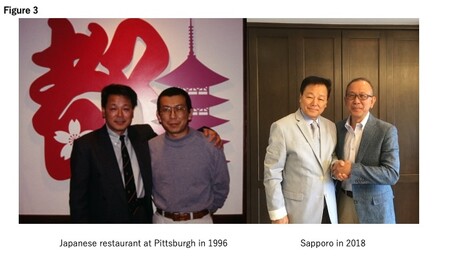
私が柏葉に働き始めてすぐの頃でしょうか。福島先生からのボイスメッセージが届いていました。今回福島先生との資料を探しているときに当時のMP3の音声データが出てきました。“どうして北大出たのか私は心配しています。民間病院に出てもずっと自分の頭蓋底手術は続けなさい”という内容でした。福島先生からは会うたびに苦しくても大学に残って教授になりなさいと言われていました。私の辛抱が足りなくて福島先生の期待に応えることはできなかったのですが、改めてこのボイスメッセージを聞いて手術だけは続けようと思っています。私の右手は経年劣化でばね指が時々痛みますが、年を重ねたからこそできる手術もあるように思います。
今の私の年齢は私がフェローだった時の福島先生の年齢を超えました。福島先生と比べるべくもありませんが、彼の何分の一かの仕事ができているかを自分に問うてしまいます。私はこれまで多くのメンターに恵まれましたが、最も影響を受けたのは間違いなく福島孝徳先生でした。先生の冥福をお祈りしますと共に心から感謝を述べたいと思います。“至らない弟子ではありましたが、先生のおかげで脳外科医としてやってこられました。これからも患者さんのために手術を続けていきます。長い間ご指導ありがとうございました。
Thank you, Taka”(Figure 4)
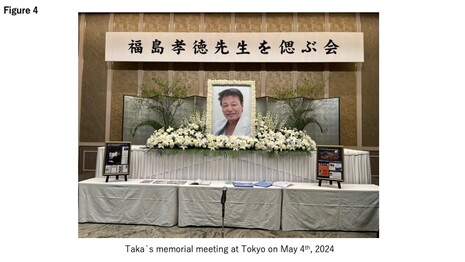
社会医療法人柏葉会 柏葉脳神経外科病院
理事長・院長 寺 坂 俊 介
In Memory of My Mentor, Dr. Takanori Fukushima
I never imagined that Dr. Takanori Fukushima would pass away. I had assumed that he was always fine and always encouraging and motivating us.
His obituary reached the self-proclaimed disciples of Dr. Fukushima on March 21, 2024.
And his death was announced on March 19th on Duke University's website.
I felt a loneliness I had never experienced before, and I am disappointed at my own inadequacy in not being able to repay him.
The first time I met Dr. Fukushima was in March 1996 when I participated in the Winter meeting hosted by Dr. Fukushima at Aspen Snowmass in Colorado, USA. In those days, I was a member of the Neurosurgery Department at Hokkaido University and was studying abroad at the University of Arkansas for Medical Science in Arkansas. I studied skull base surgery, which would become my life work, under Dr. Al-Mefty, a neurosurgeon who was attracting attention at the time. I was studying anatomy for surgery, but since I had many colleagues from all over the world, I didn't have many advanced opportunities to study. At such times, I caught information that Dr. Hiroshi Abe, a professor of neurosurgery at Hokkaido University at the time, would be participating in this Winter meeting, so I also headed from Arkansas to Colorado. So, when I complained to my professor about my predicament in Arkansas, he introduced me to Professor Fukushima. I was big surprised, especially at the ski resort, it was quickly decided that I would be transferred. I was happy, but I later found out that it is actually quite a high hurdle for a fellow to transfer.
In July 1996, I rented a one-way rental truck called U-Haul and made a big move from Arkansas in the south to Pittsburgh in the north for three nights and four days with my family. I became a fellow of Dr. Fukushima and became a member of a lab called Allegheny Neuroscience Institute.
The ANI lab had sufficient research environment, and Dr. Shir, who is Chinese, took care of the lab. That's when my life in Pittsburgh began. Dr. Fukushima was very busy with outpatient care, surgery, conferences, educating residents, and guiding us fellows and so on. Looking back, I'm sure there must have been various reasons for this, but I was surprised that major surgeries sometimes started in the evening, but I was even more surprised to see the residents saying "Goodbye, Taka!" in the evening and leaving the surgery. This was what we now call work style reform, and in that era in the United States, the weekly working hours of residents were strictly managed and limited.
Dr. Fukushima was working on writing a textbook on skull base surgery in those days, and it became my job to play a part in it. In the lab, we reproduced Dr. Fukushima's surgeries and wrote a paper on the detailed surgical anatomy with many fellows. When the book Manual of Skull Base Dissection, which we had poured a lot of time into, was completed, all the fellows were happy. The fellows worked while receiving encouraging words from Dr. Fukushima. These are the words of Dr. Fukushima that were written in the second and third editions . (Figures 1 & 2)
I was given a beeper (a pager) and was sometimes called to the operating room. Dr. Fukushima's microscope was painted gold and was called a dinosaur. I sometimes watch Dr. Fukushima's surgery videos from those days to study, and even now, 25 years later, I think he performed very impressive surgeries. Before studying under Dr. Fukushima, I had not seen many cases of vestibular schwannoma surgery in which the facial nerve was neatly preserved. This is not because the level of surgery at Hokkaido University was low, but because it was the case everywhere in Japan. I remember seeing Dr. Fukushima's vestibular schwannoma surgery in which the facial nerve was neatly preserved and truly wishing that I could perform surgery like that.
After returning to Japan, I visited Duke University, where Dr. Fukushima was enrolled at the time, again to study surgery. I observed the surgery live, studied Dr. Fukushima's surgery in the library, and even embarrassedly had him watch my surgery video, and I also have fond memories of being scolded.
I had no choice but to return to Japan in March 1997 due to visa issues. Actually, there was a reason for this. As I wrote earlier, it was very problematic for a fellow to be transferred within the United States. From the facility's perspective, this may be seen as a problem with the program of fellows. A countermeasure was taken that my visa would not be transferred to Pittsburgh. Dr. Fukushima strongly encouraged me, who was staying illegally, to obtain a work visa and remain in the United States, but I was not able to make up my mind. I left the United States one day before the serious penalty was to be imposed. Even now, I think that if I had stayed there, my life would have been completely different. I think that my time in Pittsburgh, where I studied under Dr. Fukushima, was a short but intense time that I will never forget.
In 2003, Dr. Fukushima was featured on a TV program called "Jonetsu-Tairiku", and his media exposure increased dramatically under the catchphrase "God's Hand." However, the Dr. Fukushima featured on the program seemed somehow different from Dr. Fukushima I knew, so I distanced myself from him. Dr. Fukushima I saw every day was terrified of his wife, worried a lot, liked beer, and cared about his patients more than anything else.
During the surgery, his wife would called him to request him to buy "natto" at a Japanese grocery store on his way home, which he bought and went home, while his surgery records were filled with many words of regret written in red ink, he was that kind of person. He also suffered from alopecia areata for a time. I think he was under unimaginably strong stress. On the other hand,He also liked Japanese restaurants and Hooters. I remember him munching on buffalo wings while drinking beer with relish at Hooters. ( Figure 3 )
I think it was just after I started working at Hakuyo-kai. I received a voice message from Dr. Fukushima. Recently, when I was looking for memorabilia related to Dr. Fukushima, I found an MP3 audio file from that time. It said, "I(Dr. Fukushima) am worried about why you resigned from Hokkaido University. Even if you go to a private hospital, you should continue your own skull base surgery."
He told me every time we met to stay at the university and become a professor, even if it was difficult. I was not patient enough and was not able to meet Dr. Fukushima's expectations, but after listening to his voice message again, I have decided to continue with my own surgery. My right hand sometimes hurts due to aging, but I think there are some surgeries that can only be performed by getting older.
I am now older than Dr. Fukushima was when I was a fellow. I can't compare myself to him, but I ask myself if I can do even a fraction of what he did. I have had many mentors over the years, but the one who had the greatest impact on me was undoubtedly Dr. Takanori Fukushima.
I would like to express my heartfelt gratitude to him and pray for his soul to rest in peace.
"Although I was an inadequate student, thanks to you I was able to make it as a neurosurgeon. I will continue to perform surgery for my patients. Thank you for your guidance over the years.
"Thank you, Taka." ( Figure 4 )
HAKUYOKAI
President/CEO Shunsuke Terasaka
この記事を書いた著者
